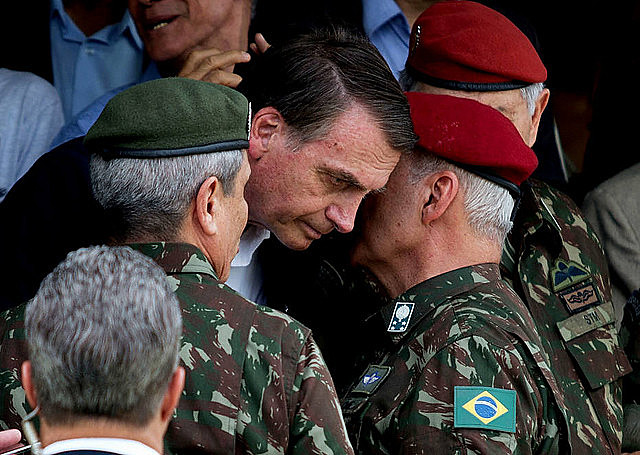A survey published by the newspaper O Estado de S. Paulo earlier this month showed that approximately 130 members of the Brazilian armed forces are currently holding high-ranking – including cabinet-level –positions in the Jair Bolsonaro administration.
Military officers currently head eight of Brazil's 22 federal cabinets, including areas such as institutional security, infrastructure, public transparency, mines and energy, science and technology, and others.
Another report from December by the Estado de S. Paulo showed that the number of army agents at upper-level government offices today is higher than during the general Castelo Branco rule (1964-1967), which kicked off the most recent military dictatorship cycle in Brazil, when there were five ministers with a military background.
Members of the armed forces are also serving at different levels, offices, and branches of the Bolsonaro administration, including the chair of Brazil’s National Indian Foundation and the country’s Institute for Colonization and Agrarian Reform.
Rosa Cimiana dos Santos, a member of a civil society board that oversees government activities with the Amnesty Committee of the Justice Ministry, argues that the comeback of the military into the government is the result of an incomplete process of effectively overcoming the 1964-1985 dictatorship.
She believes that there have been signs of an increasing military presence in governmnent since the Michel Temer administration, when Justice minister Torquato Jardim, for example, had military officers working as his aides. In the past, Jardim had connections with the military dictatorship and held different high-ranking positions under the João Figueiredo rule in the 1980s.
“They [the military] were just keeping it quiet, in the closet, but now they are unapologetically out there. They have been getting ready for this for a long time, and I think we, as the Left, who have been and still are politically persecuted, did not get ready for this. We thought we were turning a page in history. If you don’t punish the torturers, that is never really resolved,” she points out.
Historian Ana Rita Fonteles, a professor at the Federal University of Ceará, says there are different ways to look at the presence of the military in the government.
The scholar points out that the military not only owns the weapons, but also has an ethos – a set of beliefs and habits – that is different from the world of civilians. They have “a very specific hierarchy and find it very hard to deal with diverse opinions and plural views,” Fonteles says, also mentioning “the main issue of being able to impose or thwart certain positions,” with their weapons and interests.
Brazil’s history
Fonteles recalls that having armed forces personnel engaged in political movements or actions is not new in Brazil, adding that it’s not something that happened only during the 1964-1985 dictatorship. Also, the military were not always politically active to defend authoritarian and conservative practices.
The professor says that there were also times in Brazil’s history when army agents were engaged in uprisings with more democratic tendencies. She mentions the example of Luís Carlos Prestes, a lieutenant and communist politician who led a social rebel movement in the 1920s known as the Prestes Column, fighting for the right to a secret ballot and demanding compulsory public primary education.
The historian points out, nevertheless, that the military today are in the opposite side of the political spectrum, acting in the interest of groups such as the rural and economic elite, financial capital, and others.
These sectors lobby, for example, against the demarcation of indigenous lands and to advance predatory agriculture into the Amazon, “fighting social movements, disregarding politics as the realm where certain matters are discussed,” as well as pushing to loose gun control.




